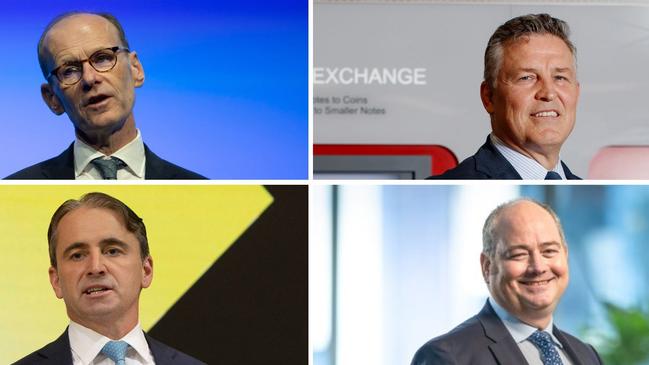Expensive bank stocks, especially CBA, now in the spotlight after Westpac fails to meet expectations
Bank stock prices have been hitting it out of the park — but the first result of the reporting season reveals a gap between expectations and the hard numbers.

Fears sky-high bank stock prices will come under pressure have been confirmed after Westpac’s annual result came in below expectations.
As the backbone of retail shareholder portfolios, bank stocks have buoyed local investors in recent months, outpacing the rest of the market thanks to institutional buyers that continued to support the big four. That support may be about to slide.
The Westpac result — a 1 per cent profit drop — confirms to sceptical investors that Australian bank stocks have surged higher all year not so much for their promising numbers but as a safe haven from tariff turmoil.
Over the past 12 months, Westpac’s shares surged 20 per cent but the wider ASX 200 index is only up by 6 per cent.
Westpac has been priced to shoot the lights out. And it didn’t.
Its board and new chief executive Anthony Miller did little for mum and dad investors by delivering a half-year dividend of 76 cents a share, which was below the bottom end of an expected range between 77 cents and 80 cents.
Many retail investors have switched to bank stocks from big miners including BHP and Rio Tinto, which have been cutting dividends. There’s been a perceived safety in bank stocks and the fully franked dividend yields they offer.
The market’s most expensive bank stock, CBA, along with peers NAB and ANZ, report key numbers in the coming days with full-year results from ANZ and NAB while CBA will report a trading update.
The market immediately marked down Westpac’s results on Monday, with the stock falling by around 3 per cent to $32.48.
According to broker consensus forecasts, Westpac would have to drop another 10 per cent to reach fair value.
Meanwhile, CBA, which has rocketed 43 per cent over the past 12 months to $166.62, would have to fall by a whopping 35 per cent to reach its fair value estimate of $109.
Extended high prices for bank stocks have created something of a disconnect since analysts have branded the sector a ‘sell’ throughout the same period.
New industry data suggests the bulk of the bank share buying in recent months could be buying from overseas funds hunting for a safe havens from Trump’s tariff.
But the tariff scare has since moderated with US markets rebounding through April.
Brokers are concerned the banks will fight to retain margins when the RBA extends rate cuts later this year.
The soft mortgage numbers reported by Westpac will also be a key concern because its rivals are more exposed to mortgage markets.
NAB’s economic team said this week it expects five rate cuts in the year ahead – it believes the RBA will cut by 50 basis points in May, followed by 25 bps in July, August, November and February.
James Kirby hosts the twice-weekly Money Puzzle podcast





To join the conversation, please log in. Don't have an account? Register
Join the conversation, you are commenting as Logout